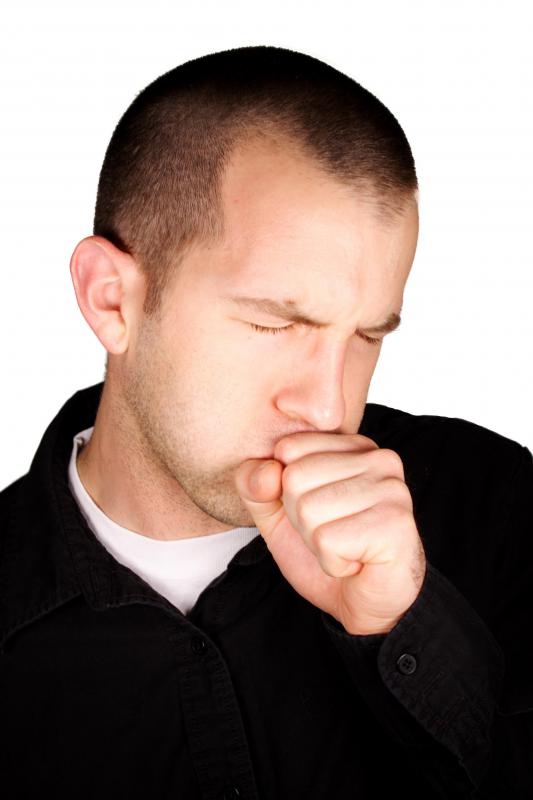At WiseGEEK, we're committed to delivering accurate, trustworthy information. Our expert-authored content is rigorously fact-checked and sourced from credible authorities. Discover how we uphold the highest standards in providing you with reliable knowledge.
What are Common Causes of a Dry Cough and Fever?
A dry cough and fever often happen together, and can be caused by the flu, pneumonia, measles, or other illnesses. Most of the conditions associated with these symptoms can be treated with medication and home rest, but they can also be a sign of serious illnesses that require immediate medical treatment. If a person has trouble breathing, a fever of over 101.5°F (about 38.5° C), or is still sick after more than a week, he or she should see a healthcare professional.
Common Cold

A cold can cause a dry cough and fever, though not everyone who has a cold gets a fever, and most who do only have a low-grade one. Most people with this illness get muscle pains and headaches and tire easily until they get better. Colds can generally be treated at home by drinking lots of fluids to thin and loosen up phlegm, taking non-steroidal anti-inflammatory drugs (NSAIDs) to lower any fever and treat muscle pain or headaches, and taking over-the-counter (OTC) cold medications.
Influenza

The flu is one of the most common conditions to cause a dry cough and fever, as well as muscle aches, weakness, congestion or a runny nose, and a sore throat. It can usually be treated with OTC decongestants, antihistamines, or cough medications, along with painkillers to reduce muscle aches. The elderly, children, and those with weakened immune systems should always seek medical treatment for the flu, as should people with severe headaches, symptoms that become worse after a few days, and those with very high or recurring fevers.
Bronchitis

Similarly to influenza, bronchitis is caused by an infection, which irritates the bronchi, the main airways of the lungs. It causes a dry cough and fever that then progresses into a hacking, productive cough after a day or two. Most cases resolve on their own and can be treated by drinking lots of fluids, resting, and taking NSAIDs. It’s best to not take a cough suppressant, since this can keep the body from getting the irritating mucus out of the lungs. Some people have bronchitis symptoms long-term, but this is generally caused by external irritants instead of infectious substances and is most common in people who smoke or who work around irritants. Those with symptoms that don’t resolve in a few weeks should see a healthcare professional to rule out the possibility of chronic bronchitis.
Pneumonia

Pneumonia is a serious medical condition that can occur as a complication of either influenza or bronchitis. It’s characterized by the lungs becoming inflamed by an infection caused by fungi, bacteria, or a virus. In the beginning stages, this condition often has similar symptoms to the flu, including a fever, an unproductive cough, and muscle aches. As it develops, symptoms usually get more severe, with patients having chest pain, chills, shivering, and problems breathing. People who have flu-like symptoms that don’t get better with home care or last for over a week should seek medical treatment to rule out the possibility of pneumonia and prevent complications.

This condition is generally treated with antibiotics, antivirals, or antifungals, depending on the underlying cause. Most people also take NSAIDs to reduce their fever and treat muscle pain and use oxygen therapy if they have trouble breathing. In very severe cases, a person may need surgery to remove infected lung tissue.
Measles
Measles is a respiratory disease caused by a virus with the same name. It affects both the throat and lungs, causing a runny nose, sensitivity to light, a full-body rash, and a dry cough and fever. Though there is no cure for this illness, the symptoms can be treated to make the patient comfortable until runs its course. NSAIDs or acetaminophen can be used to reduce fevers and taking vitamin A can lessen the severity of symptoms. Since many people with measles get secondary infections like ear infections or pneumonia, they may need other medications, like antibiotics.

Anyone who’s been exposed to this virus should get immediate medical treatment and avoid other people until he or she is totally well, since it is extremely contagious. Parents can also prevent their children from getting measles by having them get a measles, mumps, and rubella (MMR) vaccine when they’re 12 to 24 months old. Those who do not get the vaccine can still be at risk for the disease, even as adults.
AS FEATURED ON:
AS FEATURED ON:


















Discussion Comments
I don't know what the symptoms are for pneumonia very well but I feel really weak and whenever I take a deep breath, I start to cough really bad. I also have bad headaches and really bad chest pains. Does anyone know what I have?
I have some bad seasonal allergies, and I commonly get a dry cough and headache when exposed to certain things, like very thick pollen in the air. I've never gotten a fever from my allergies, but the coughing and headaches are bad enough.
I find that one way to soothe a dry itchy throat and a persistent cough from allergies is to fold a piece of paper towel into quarters, wet it down under the faucet, and then press it over my mouth and breathe through it.
The moisture from the towel helps to soothe the itching and dry throat feelings that are making me cough, and the paper towel helps filter out the pollen that I would otherwise by breathing in.
@popcorn - You're on the right track with the honey, there. I usually combine that and what you said about gargling with salt water: I gargle honey around, then swallow it afterward. It leaves a nice soothing honey coating on my throat to help with the dry itchiness and any coughing it makes me do.
Honey is a wonderful all natural antibacterial agent. If your sore throat is caused by a virus or bacterial infection, the honey should help not only to soothe the symptoms, but also to kill the virus or bacteria.
When I start coming down with a sore throat, i immediately gargle some honey and then swallow it. I do this for a few days, and I do it several times per day -- usually right after breakfast, so that I won't eat anything for awhile to make me swallow the honey coating in my throat, and then right before bed, which helps me fall asleep at night with an itchy throat condition.
Gargling honey makes dry cough type sore throats go away super fast -- for me, at least half the time it usually takes without using honey. Sometimes if I'm fast enough, the honey kills the virus or bacteria before it even gets a chance to give me much of a sore throat at all, and so I don't get very sick that time.
This is my home remedy for a sore throat with dry cough and no fever, though. If you have a fever, things usually are more serious. If the fever and sore throat don't go away within a couple of days, schedule a doctor's appointment -- better safe than sorry.
A dry couch can be one of the most uncomfortable symptoms as it often feels as if there is tickle in your throat that you just can't get to. Some remedies you can try at home to lesson the annoyance you feel with your cough are completely natural.
If you have honey around, try to have some. Just swallow a tablespoon like you would cough syrup. You'll be amazed at how this can help.
You should also try drinking warm water as cool drinks can irritate your throat even more.
Lastly, if you throat feels raw, gargling with a salt and water mix can help ease the pain.
If you have a dry cough fever over 103 degrees and it refuses to come down you should always head straight to a doctor. Sometimes when you get influenza it can be very stubborn to treat and you may need special medication.
Often a fever will abate if you take over the counter pills and have a cool bath, but if not it means that something is seriously wrong.
If at any time your high fever causes dizziness or nausea, or your neck gets really sore, head to the emergency room. These symptoms can result in serious damage to your body.
Post your comments